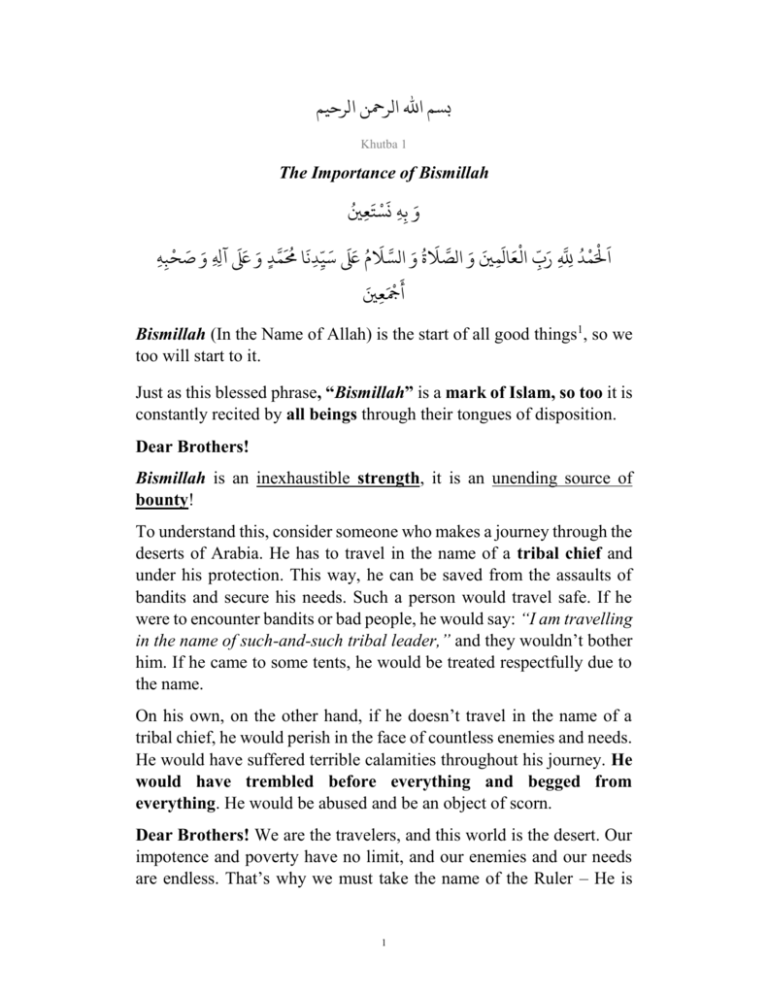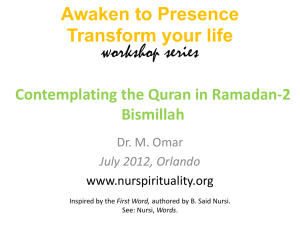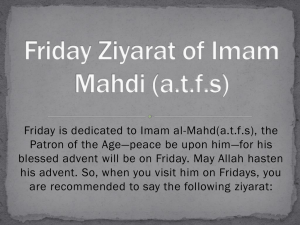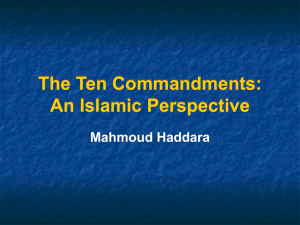The Importance Of Bismillah
advertisement

بسم اهلل الرمحن الرحیم Khutba 1 The Importance of Bismillah َو به ن َ ْستَع ن ي ِِ ِ ْ َ ََ ْ َ ي َو َ َ الص َل نة َو َ َ ن َ َ َ َ ن َ ْل َ ْم ند َلِل َبّ الْ َعالَم آِل َو َصح ِب ِه ا ِ ِ َ السلم َ َ ِی ِدنا ُمم ٍد َو ِ ِ ِ ِ َ ْجع َ ْ َأ ي ِ Bismillah (In the Name of Allah) is the start of all good things1, so we too will start to it. Just as this blessed phrase, “Bismillah” is a mark of Islam, so too it is constantly recited by all beings through their tongues of disposition. Dear Brothers! Bismillah is an inexhaustible strength, it is an unending source of bounty! To understand this, consider someone who makes a journey through the deserts of Arabia. He has to travel in the name of a tribal chief and under his protection. This way, he can be saved from the assaults of bandits and secure his needs. Such a person would travel safe. If he were to encounter bandits or bad people, he would say: “I am travelling in the name of such-and-such tribal leader,” and they wouldn’t bother him. If he came to some tents, he would be treated respectfully due to the name. On his own, on the other hand, if he doesn’t travel in the name of a tribal chief, he would perish in the face of countless enemies and needs. He would have suffered terrible calamities throughout his journey. He would have trembled before everything and begged from everything. He would be abused and be an object of scorn. Dear Brothers! We are the travelers, and this world is the desert. Our impotence and poverty have no limit, and our enemies and our needs are endless. That’s why we must take the name of the Ruler – He is 1 Allah; al-Mâlik al-Abadiy and al-Hâkim al-Azaliy; The Pre-Eternal Ruler and Post-Eternal Lord – of this desert and be saved from begging before the whole universe and trembling before every event. Yes, the phrase Bismillah is a treasure so blessed that our infinite impotence and poverty bind us to an infinite power and mercy; it makes our impotence and poverty a most acceptable intercessor at the Court of al-Qadîr al-Rahîm –One All-Powerful and Compassionate. One might wonder: How does everything recite Bismillah through its very mode of existence? Well, if you were to see that a single person had come and had driven all the inhabitants of a town to a place, compelling them to work; you would assume that he had not acted in his own name and through his own power, but rather was a soldier, acting in the name of the government and relying on the power of a king. In the same way, all things act in the name of Almighty Allah, for small things like seeds and grains bear huge trees on their heads; they raise loads like mountains. Each tree says Bismillah and, filling its hands with fruit from treasury of Mercy, offers them to us on a tray. Each garden, a cooking pot from the kitchen of the Divine Power where countless varieties of delicious foods are prepared, says Bismillah. All blessed animals like cows, camels, sheep, and goats, say: “Bismillah,” and produce milk from Faizu’r-Rahmah – the abundance of mercy, offering us a most delicate and pure food like the water of life in the name of al-Razzaq – the Provider. All plant, tree, and grass roots and fibers, soft as silk, say Bismillah and pierce hard stones and soil. They say, “In the name of Allah, in the name of Rahman!” and everything becomes subjected to them. A tree’s branches spread in the sky, and its roots spread unhindered among stones and soil. It generates underground spontaneously, and its delicate green leaves hold moisture despite intense heat. These realities vex the naturalist. It jabs a finger into the naturalist’s unseeing eye and says: “You put so much trust in the power of hardness and heat, yet they obey the Divine Command. That is why each soft fiber of the plant’s roots, like the staff of Musa (a.s), obeys: 2 ۡ َۡ َُ َ ٱۡضب ب َع َص َ ٱۡل َ ۡ اك ﴾ج َر “ ﴿فقلناAnd We said: ‘strike the rock with your ِ ِ staff!’” (2:60) and penetrates the rock. Every delicate, paper-thin leaf, ُ ُ َ َ َ ٗ َ like one of the limbs of Ibrahim (a.s), recites: ﴾وِن ب ۡردا َو َسل َٰ ًما ك ِ ﴿يَٰنار “O fire, be cool and peace!” (21:69) in defiance of the intense heat. Since all things say: “Bismillah” and bear Allah’s bounties in Allah’s name, and give them to us, we too should say: “Bismillah”, give in the name of Allah, and take in the name of Allah. We should not take from heedless people who neglect to give in Allah’s name. Dear Brothers! We pay people for whatever they bring us, even though they are only “tray-bearers” or conveyers, but what payment does the True Owner – Allah, ask of us? The price al-Mun’im al-Haqiqiy – the True Giver of these bounties wants in return is three things: Zikr – remembrance, Shukr – thanksgiving and Fikr – reflection. Saying, “Bismillah” at the start is remembrance, and, “Alhamdulillah” (All praise be to Allah) at the end is thanks. And in the middle, perceiving and thinking about those bounties that are priceless wonders of art, as the miracles of the Qudrah of Ahad, Samad – Eternally Besought One’s Power [ معجزة قدرة األحد ]الصمدand gifts of His mercy, is reflection. If you kissed the hand of someone who brought you a precious gift without recognizing the true sender (the king), you would be making a great mistake. Praising and loving the conveyer of bounty, while forgetting al-Mun’im al-Haqiqiy – the true Bestower of Bounty, is far worse. If you wish to avoid such stupidity: Give in the name of Allah, take in the name of Allah, begin in the name of Allah, and act in the name of Allah. Wassalam! References The Words/First Word, Said Nursi. Prepared by Islam Bedir. 3 نل َْ ك أَ ْمر ِذي بَال َل نيبْ َدأن ِفی ِه بب ْسم َ َ ْ َ َ یم أق َط نع»[ .خطیب ابلغدادي] « الِل الرمح ِن الر ِح ِ ِِ ِ ِ ٍ ٍ َ ن َ ْ َ ل ن ْ ن ْ َ ال ،ل يبْ َدأ ِفی ِه بِاْل َ ْم ِد ،أق َط نع»[ .ه] «ك أم ٍر ِذي ب ٍ نل َ َ ْ َ ََ َ َ َ َن َ ََْن َ َ َ َْ لَكمٍ أَ ْو أَ ْمر ذى بَ َ ن ْ َ ن ت أ ْو قال أق َط نع»[ .أ] الِل عز وجل فهو أب «ك ٍ ِ ال ل يفتح بِ ِذك ِر ِ ٍ 4 See: 1









